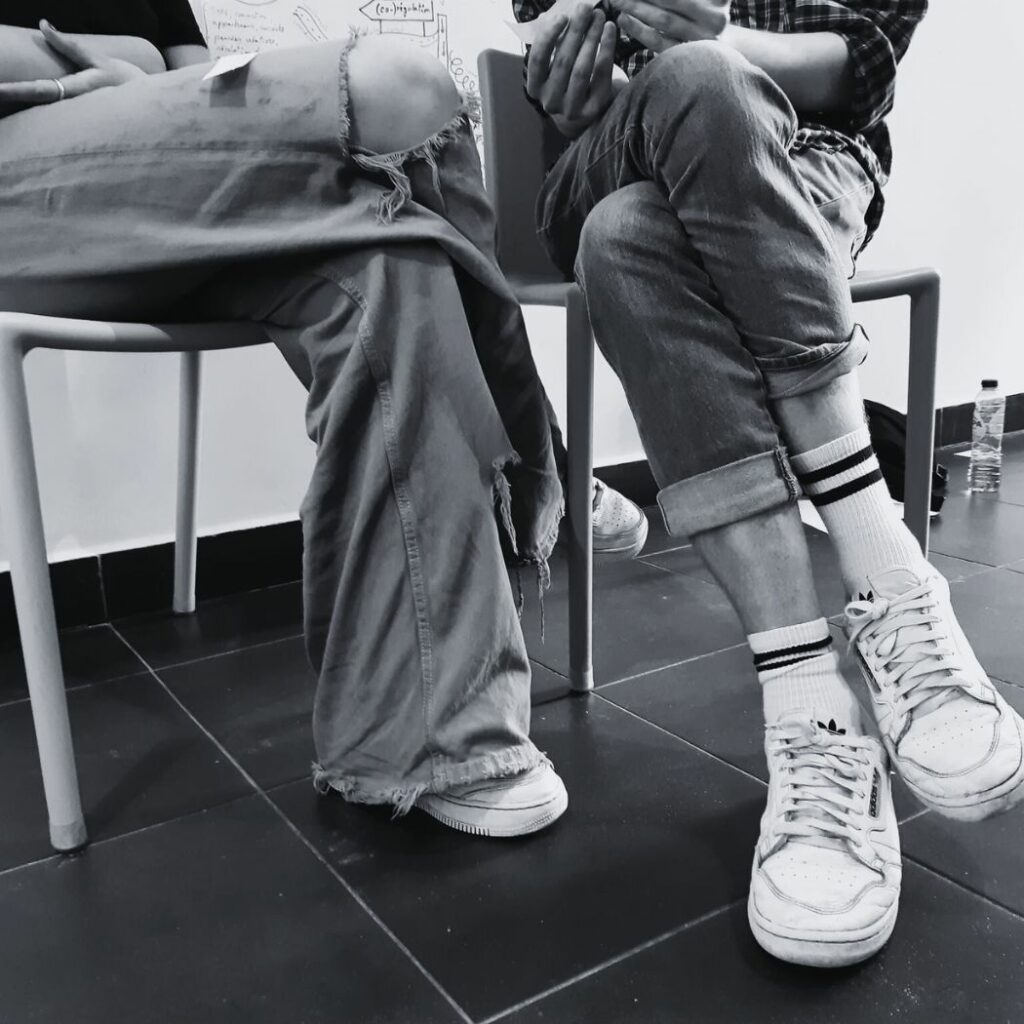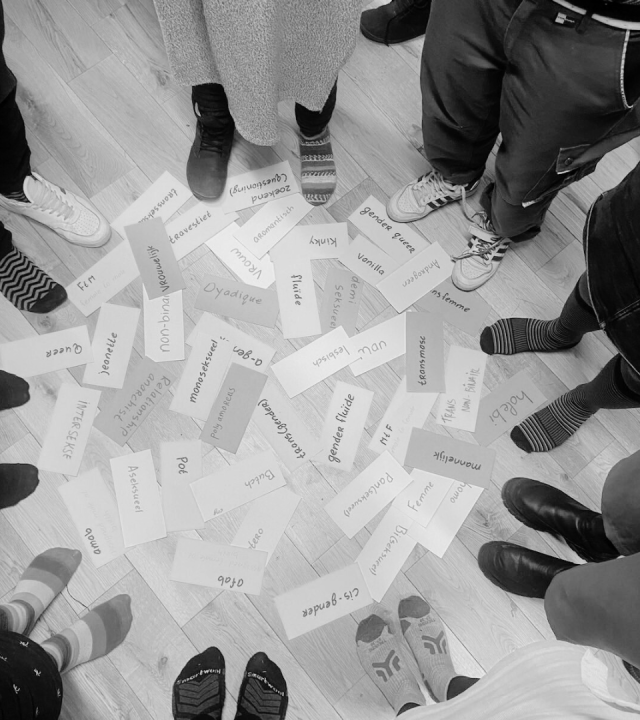
Our roots: queer, intersectional, decolonial, anti-capitalist feminism
What do we offer ?
Open workshops
We regularly organise open workshops, to which anyone can apply, around emotional resilience, inclusivity and feminist self-defence.
Bespoke for existing groups
We offer bespoke workshops or groups processes for existing organisations, groups or collectives.
We can work in French, Dutch and English. We organise both mixed trainings and trainings for specific target groups (e.g. lgbtqia+, bipoc, white, ….)
Our workshops can take anywhere from 3 hours to 3 days.
We are always looking for new partners to work with, so contact us if you want to collaborate!
Queer feminist Self-Defense
Knowing how to defend ourselves from violence is crucial for the survival of women and LGBTQIA+ folks, living in a neo-colonial cis-heteronormative capitalist patriarchy. Since 2023 we offer feminist self-defence workshops to different target groups.
Drawing from historical feminist self-defense (Wen Do, Riposte, Seito Boei) and emphasizing a somatic approach (body and mind), we integrate psychological, verbal, emotional, and physical self-defense methods. Our workshops address stress responses, aiming to build self-confidence, security, and awareness. They include role-playing, exercises in boundary setting and practical self-defense techniques.
We strive to improve these workshops for LGBTQIA+ folks, neurodivergent folks and racialized folks. We occasionally collaborate with freelance trainers to organise trainings in chosen mixity for communities that our volunteer trainers are not a part of (for example trainings for racialised folks).
- No events
- No upcoming events
Emotional Resilience
Emotional resilience can help people ‘bounce back’ after stress or difficulty and help us to either prevent or cope with burn-out or post-traumatic stress.
A resilient group culture supports our collectives and organisations to survive, adapt and become more efficient at creating lasting change. Resilient group cultures prevent burn-out and support members to stay active through major life-changes such as illness, becoming a parent, bereavement and ageing.
Collective care provides us with an alternative for neo-liberal models of care, where the individual is held responsible for their own health and support systems. Collectivising this responsibility decision is part generating a resilient and inclusive group culture.
Inclusivity
Becoming more aware of our privileges, gaining skills in navigating power dynamics and deepening our understanding of systems of oppression are some of the first steps in creating more inclusive groups. We regularly support existing groups, collectives and organisations to create more inclusivity and navigate power dynamics in a transformative way.
In our facilitation training “more inclusive facilitation”, developed together with Tractie, we educate new facilitators not only on facilitation and meetings skills, but ensure that they are able to implement these skills in a way that increases inclusivity and amplifies marginalised voices. We also offer open workshops around the inclusion of a specific target group, such as the inclusion of LGBTQIA+ folks.
- No upcoming events
Bespoke for existing groups
With our activities we aim to support the work of grassroots groups, collectives and organisations working towards social- and ecological justice active in Belgium, the Netherlands and France. Some of the topics that we regularly support groups with are: burn-out prevention, collective care, (queer) inclusivity, addressing power dynamics, emotional resilience, teambuilding, collective visioning, decision making. We design these workshops or processes based on your needs and requests.
We work with the principle of a “solidarity economy” and suggest the following guidelines, as a price per session (3-4 hours) with two trainers:
Small groups without funding: €20 to €200 euros
Small to medium-sized organisations: €200 to €500
Organisations with more than 4 to 10 FTE : €500 to €1.000
Organisations with 10+ FTE : €1.000 to €2.000
These prices are based on the work we offer with our internal pool of volunteer trainers. For certain topics we might need to reach out to freelance trainers, to bring in experience/expertise that our volunteers don’t have. In this case we will indicate more specific prices.


Choosen mixity | caucuses | inclusivity
Caucuses or chosen mixity groups are opportunities for those who share a common identity to meet separately to gather, connect, and learn. We see this practice as a short-term working tool, not as a long-term organising strategy.
We don’t believe in “safe” spaces and we are aware that violence can / will also exist in chosen mixity spaces. However we hope that in these spaces the level of threat can be reduced, freeing up capacity for learning, connection and community building.
The practice as we use it at Feros originated in racial justice movements in the United States and has parallels with feminist and lgbtqia+ organising strategies. More info can be found here: https://www.racialequitytools.org/resources/act/strategies/caucus-and-affinity-groups
Mixed trainings
In order to build the equitable and sustainable society we envision, we will need to learn to work together in mixed groups. However, that requires all of us to unlearn the racism, sexism, ableism, etc. that we grew up with. And that will not happen overnight.
In mixed groups our facilitators will do their best to ensure that (micro) aggressions are addressed in a way that centralises the needs of the target and that those dealing with oppression in everyday life are not pushed to do emotional work for the education of others with more privilege.


Venues
Short workshops
We prefer to organise in social centres such as squats, cultural centres or temporary occupations. We always chose venues that are accessible by public transport.
Whenever possible we try to find venues that are accessible for participants with physical or sensory access needs.
Residential trainings
For multi-day workshops we strongly prefer residential settings as it supports the group to feel connected, contained and taken care of. During residential trainings we provide vegan meals with sustainable ingredients, with glutenfree and vegetarian options.
The venues we currently use are De Karmel (Brugge) and Heibrand, both chiro (youth movement) houses close to a forest. You can find more information here and here.